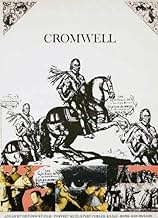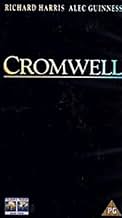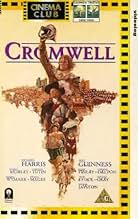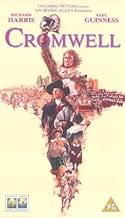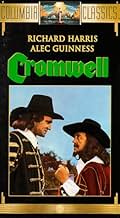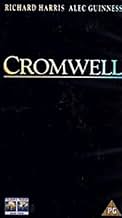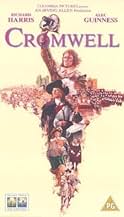Oliver Cromwell non può più tollerare le politiche di re Carlo e l'interesse personale della classe dominante.Oliver Cromwell non può più tollerare le politiche di re Carlo e l'interesse personale della classe dominante.Oliver Cromwell non può più tollerare le politiche di re Carlo e l'interesse personale della classe dominante.
- Regia
- Sceneggiatura
- Star
- Vincitore di 1 Oscar
- 2 vittorie e 5 candidature totali
Recensioni in evidenza
However, putting that to one side, the film version of Cromwell's growing involvement in the War is marginally accurate and well done. Richard Harris, as Cromwell, makes a decent effort although I do feel he makes too much of a theatrical job with the role, with far too much posturing, self-smugness, and above all shouting....
I can understand his unhappiness at the Royalists encroachment of the Common People's liberties; and I can understand him fully remonstrating his feelings in the House of Commons, but Harris seems to shout in nearly every scene. So much so that by the end of the movie he is struggling for breath.
Conversely, Alec Guiness's Charles I is far more intelligently done. Underplayed yet convincing & too some extents we feel more sympathetic to his plight. After all he has a rather scheming Cathloic French Queen, the Catholic Church and a lot of other distractions to occupy his mind and usurp his powers.
The battle scenes are convincing but don't carry the same kind of savagery than the more prosaic Braveheart. But the supporting characters do a good job and add a more rounded feel from Harris' turgid performance.
The directing blows hot & cold, sometimes the story drifts & meanders before pulling back into sharp focus; while the choreography is sweeping & rich in content. The musical score, however, seems tacky & amateurish, lacking any depth in conjunction with what's going on in the film.
However, for all its faults and historical inaccuracies, we do get a slightly better insight into a rather grim & dark chapter in England's turbulent history.
Cromwell is a good film but should be taken with a large pinch of salt as far as retelling history is concerned.
***/*****
Such a career deserves a careful movie. CROMWELL is not that film. It does do well in showing King Charles I (Alec Guinness) as a untrustworthy individual (though one driven to such actions because of his need to maintain his rights as monarch). It does make one serious howler regarding Charles I and his trial for treason. Charles may have been a liar and betrayer at times - but Sir Edward Hyde (who was a leading supporter of his, and would be a statesman in his son's reign and the father-in-law of the future James II) did not testify at Charles's trial as a witness for the prosecution.
Such glaring errors are frequent in the movie (for example, Prince Rupert was not dismissed so callously by his uncle King Charles - Rupert was a very fine cavalry leader, and would remain a fixture in English society when Charles II was restored). The subtle acting of Guinness is not matched by Harris, who rants and raves throughout the film - even in the closing moments talking about his intentions to create better schools and laws. Charles and Cromwell are two fascinating characters, and both deserve a better film than this as the sole film about the English Civil Wars (except for Vincent Price's THE CONQUEROR WORM) to come out.
Like the many tellings of the story of Mary Tudor and Mary Stuart which have them in climatic meeting, we have Oliver Cromwell and Mary Stuart's grandson, Charles I meeting not once, but several times. They too never met, but the story demands it.
In point of fact Oliver Cromwell was a minor figure in the war between the Crown and Parliament until the Parliamentary Army lost a series of battles and looked like they were going down for the count. It was at that point that Cromwell emerged as a military leader. It turned out that this previously obscure member of Parliament who had no previous military training had a natural genius for warmaking. He turned that army around and eventually Parliament won.
Cromwell could have been George Washington at this point and retired to the farm, but he used his prestige and not as reluctantly as this film shows to make himself the military dictator of Great Britain with the title of Lord Protector.
The experience of Cromwell's reign scarred the English body politic for generations and to a large degree the American one as well. The whole struggle over which interpretation of Christianity would hold sway was something all of the ancestors of the American founding fathers had to deal with. That's when the idea came to them to have no established religion in America. Cromwell's large standing Ironsides Army enforcing his dictatorship led to a positive mania about no standing armies, no quartering of troops and even the right to bear arms. All this because of a collective memory of the Lord Protector.
Richard Harris is a lean and mean Cromwell who keeps saying he just wants to go back to the farm, but somehow winds up grabbing for more power. Alec Guinness is the perfect conception of that luckless monarch Charles I. Please note the relationship between Guinness and Queen Henrietta Marie played by Dorothy Tutin. Two things should be remembered there. First Henrietta Marie is the sister of Louis XIV of France, a monarch with considerable more power than Charles has. Note how Tutin is constantly berating Guinness for not standing up to the Parliament. He does and see where it gets him. Secondly Charles I is one of the very few English monarchs with no royal paramours. He and the Queen were actually in love and he knew her advice was from the heart if it proved disastrous.
Please note a couple of other good performances, Timothy Dalton as Prince Ruppert of the Rhine, Charles's nephew from Germany who actually was a whole lot smarter than he's shown here. And Robert Morley as the Earl of Manchester, one of Cromwell's rivals in the Parliamentary camp.
Oliver Cromwell died in 1558 quite suddenly and within two years the Stuart Monarchy was restored under Charles II, oldest son of Charles I and Henrietta Marie. The collapse of the Protectorate is a subject that English historians have some raging debates over. It was very much like the collapse of the Soviet Union in our time. The collapse of the Protectorate and the Restoration of the Stuarts was filmed in Douglas Fairbanks Jr.'s The Exile and really needs an up to date treatment.
Cromwell as a film is magnificently photographed and directed and actually won an Oscar for costume design. But the flaws in the story line are too many and don't use this film as Cliff's notes kids.
"Cromwell" is one of the few exceptions. As the title suggests, it is based on the life of Oliver Cromwell and concentrates on the 1640s, the decade during which Cromwell rose from a modest Huntingdonshire country squire to commander of the Parliamentary forces during the English Civil War and played a leading role in the deposition and execution of King Charles I. It has less to say about Cromwell's rule as Lord Protector of Great Britain and Ireland in the 1650s.
The film has been criticised for its historical inaccuracies. This sort of thing can normally be put down to a lack of adequate research, and the film does indeed contain a few mistakes of this type. (Cromwell's son Oliver junior was not killed at the Battle of Naseby but died of natural causes, and the Earl of Essex and the Earl of Manchester are shown as sitting in the House of Commons rather than the House of Lords). In most cases, however, inaccuracies which might appear to be careless errors are really deliberate distortions made to fit in with the film's underlying agenda which is to whitewash Cromwell's character and to present him as a hero of democracy.
In the period leading up to the Civil War, Cromwell's prominence in the opposition to Charles I is exaggerated. In a meeting which never took place, he is shown as telling the King that England should be a democracy and he is incorrectly numbered among the five members of Parliament whom Charles attempts to arrest.
During the war itself the film depicts Cromwell as single-handedly transforming the Parliamentary Army, after a disastrous defeat at the Battle of Edgehill, from a disorganised rabble into an effective fighting force and as a military genius whose tactics are responsible for the defeat of a numerically superior Royalist force at the Battle of Naseby. In fact, Edgehill was an indecisive battle rather than an outright Royalist victory- if Charles had won as decisively as he is shown doing here the war would probably have been over very quickly- and at Naseby it was the defeated Royalists, not the victorious Roundheads, who were outnumbered. The film omits the Battle of Marston Moor, arguably a more decisive turning-point than Naseby, possibly because Cromwell was not in overall command of the Parliamentary armies on that occasions. (The commanders in that battle were Sir Thomas Fairfax and Manchester, neither of whom are shown in a good light in the film). To emphasise Cromwell's piety, the famous prayer of the Royalist Sir Jacob Astley at Edgehill is put into his mouth.
The main reason why the film does not concentrate too much on Cromwell's record after 1649 is that that record will not bear too much scrutiny if one regards him as a hero. Although one view of history has traditionally seen the Roundheads as fighting for parliamentary democracy, Cromwell made himself dictator of Britain by force of arms, succeeded where Charles had failed in ruling without Parliament and had himself proclaimed Lord Protector, monarch in all but name. Had his son Richard, who briefly and ineffectually succeeded him, been a man of the same ruthless stamp, Britain might today be a Hereditary Protectorate under the House of Cromwell. The greatest stain on Cromwell's memory, the brutal subjugation of Ireland which cost several hundreds of thousands of lives, is totally ignored. (The film gives the impression that he spent the years in question, 1649-53, living peacefully on his farm in Huntingdon).
As a costume drama the film is not a bad one and succeeds in bringing seventeenth-century England to life. Richard Harris is not particularly good in the title role, especially as he is not always successful in concealing his Irish accent. (Given Cromwell's antipathy to, and persecution of, the Irish, it seemed ironic to have him played by an Irishman). There is, however, an excellent performance from Alec Guinness as Charles I, who is treated more objectively than are his political opponents. There is no attempt to blacken Charles' character, although there are a couple of inaccuracies. Charles did not treat his nephew Prince Rupert as shabbily as he is shown doing here, and his trusted adviser Sir Edward Hyde did not testify against him at his trial. (Had Hyde done so, he would doubtless have been executed at the Restoration instead of becoming Charles II's chief minister). Guinness plays Charles as a man who, beneath his outward dignity and firm belief in the Divine Right of Kings, is nervous, hesitant and self-doubting, something indicated by a stammer. One senses from Guinness' portrayal that although Charles was a bad king he may not have been a bad man.
Some have seen a film which praises a republican rebel as revolutionary, but in fact hagiography of Cromwell is far from something new. The film's politics fall broadly within the Whig tradition, which saw English history in terms of a steady progression towards the triumph of liberty and Protestantism- two concepts which for the Whigs were practically indistinguishable- and the Civil War as a vital step in this process. The film also shows the influence of Thomas Carlyle, who regarded Cromwell as one of the heroes of history and eulogised him in his "Heroes and Hero-Worship". By 1970, however, this approach to history was starting to look outdated and Carlyle's idea of hero-worship hopelessly naive. If the charismatic dictators of the twentieth century have taught us anything, it is to beware of the strong man on the white horse. 7/10
Alec Guiness's king is impressive and his relationship with the catholic queen should have been more developed .Dame Dorothy Tutin's rendering is subtle and she makes all her scenes count.There is also Robert Morley and Timothy Dalton who give strong support.
Queen Henrietta took refuge in France and her daughter Henriette married the king Louis XIV 's brother ,"Monsieur" .Sadly she was to pass away at a very early age probably of peritonitis(few historians still speak of poisoning).
"Cromwell" ,which I saw when it was released ,has stood the test of time quite well,thanks to all these wonderful actors.In his own way,Cromwell was an incorruptible person ,ahead of his time,who predates Robespierre .The fact that he substituted a dictatorship for another one does not ruin his main revolutionary idea:a king is not infallible, the absolute monarchy means tyranny.A century and a half later ,minister Turgot told Louis XVI :"do not forget Charles the first,Sire!"
Lo sapevi?
- QuizWhen writer / director Ken Hughes said to Richard Harris that no self-respecting Irishman should ever play Oliver Cromwell, Harris laughed.
- BlooperCromwell was not one of the Members of Parliament named for arrest in the King's warrant. Cromwell was not present in Parliament at the time the King and his troops entered the House of Commons. The scene of he alluding that The King is a traitor actually happened with John Elliott some ten years prior.
- Citazioni
King Charles: I do swear that hold this England and its laws dearer to my heart than any here. But gentlemen, if you would reduce me to a figurehead - a puppet king, manipulated by parliament - how then would I serve my country? What manner of king would I be?
Oliver Cromwell: I am persuaded, Your Majesty, that England must move forward to a more enlightened form of government, based upon a true representation of a free people. Such an institution is known as... "democracy", sir.
King Charles: Democracy, Mister...
Oliver Cromwell: Cromwell, sir.
King Charles: Democracy, Mister Cromwell, was a Greek drollery based on the foolish notion that there are extraordinary possibilities in very ordinary people.
Oliver Cromwell: It is the ordinary people, my lord, who would most readily lay down their lives in defense of your realm. It is simply that "being ordinary", they would prefer to be asked - and not told.
- ConnessioniFeatured in 52nd Annual Academy Awards (1980)
I più visti
Dettagli
- Data di uscita
- Paesi di origine
- Lingua
- Celebre anche come
- Cromwell - Nel suo pugno la forza di un popolo
- Luoghi delle riprese
- Aziende produttrici
- Vedi altri crediti dell’azienda su IMDbPro
Botteghino
- Budget
- 3.750.000 £ (previsto)
- Tempo di esecuzione
- 2h 19min(139 min)



